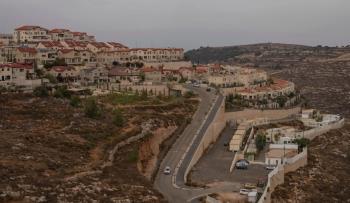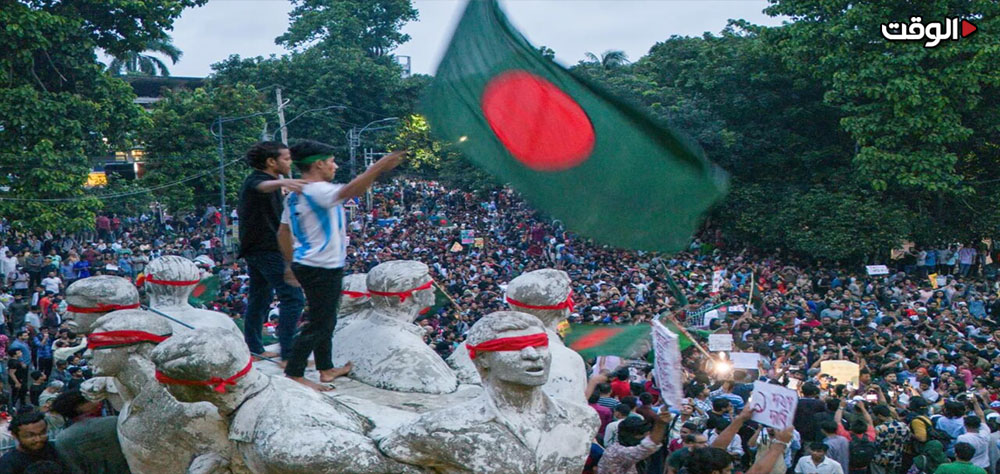Alwaght- Less than six months after Bangladesh parliamentary elections and assumption of power by Sheikh Hasina from the ruling Awami League, a street uprising all of a sudden overthrew the new government.
Before the protests, Bangladesh was politically fragile, but after the elections, the country looked stable. Despite the public's obvious frustration with the state of the economy and politics, few citizens agreed to join the government's opponents in protesting the election results, and as a result, political opposition was marginalized.
Indeed, although Bangladesh's one-party government probably faced structural problems with corruption and lack of accountability, these did not appear to be problems that could topple the government.
Therefore, the speed of developments in bringing this country to a political crisis was surprising and has made the future situation unclear.
Popular protests in Bangladesh began in early July after the government passed a bill that would have reserved half of the country's employment posts for certain groups.
Based on this, nearly 30 percent of the job opportunities were allocated for the relatives of those injured and veterans who participated in the Bangladesh War of Independence from Pakistan in 1971. Protesters described this bill as an example of discrimination and a form of monopolization depriving them of specialized and meritocratic management.
Although the protests were peaceful, they were met with bloody crackdown from the beginning, and although the government continued to back down and with the ruling and intervention of the Supreme Court, most of the employment quotas were canceled, the protesters, mainly the students, demanded justice for the families of the killed protestors, especially that the PM labeled the protesters terrorists, igniting further demonstrations.
The protests was so widespread that 13 officers from the police forces with different ranks were killed, and the crisis went so high that garment factories, which have dramatically transformed the economy of Bangladesh in recent years, were often closed down voluntarily to join the protesters.
Finally, after three weeks of protests and with the death toll of these protests increasing to more than 300, people stormed the PM's office, forcing her to flee the country.
Sheikh Hasina, who ruled this South Asian country of 170 million for 15 years, fled to India last Monday. It was said that she resigned from her position before fleeing to India, but her son stated that she did not do so.
Forming interim government
After Hasina's fleeing , an interim government led by Nobel Peace Prize winner Muhammad Yunus was formed to begin the difficult task of restoring stability and order to the country. Those helping Yunus' new government include the general who oversaw Hasina's departure, as well as a veteran civil servant.
Yunus has said that he will hold elections in Bangladesh in the next few months, and Sheikh Hasina's son has also said that the resigned PM will return to Bangladesh when the elections are held.
According to the Bangladesh constitution, the interim government is required to hold new parliamentary elections within the next 90 days, and given the circumstances, the opposition parties can try their luck to strengthen their popular base.
Nevertheless, even after interim government was formed, protests did not settle and the protesters flooded the streets once again and raised new demands from the political leaders. With the continuation of protests in Bangladesh and the push by protestors for resignation of officials appointed by Sheikh Hasina, the judiciary head and central bank governor stepped down.
While the focus of the protests was ostensibly on the quotas, the grievances accumulated over the past years have quickly radicalized and transformationalized the protests.
Under Hasina's rule, Bangladesh saw GDP growth, but this failed to bring economic prosperity to many Bangladeshis. Lack of opportunities, high youth unemployment and rising inflation have been constant sources of tension in recent years.
Bangladesh developments in the court of geopolitical competitions
Some experts suggest that if the results of the current crisis are not quickly put on the normal path, alliances in the region are open to changes and can transform the geopolitical landscape of South Asia.
According to AFP, in the field of foreign policy, Bangladesh is almost completely surrounded by India with a deeply intertwined history, and India's dominant economy overshadows Bangladesh, though Hasina had friendly relations with China.
India and China, the world's two most populous nations, are powerful rivals vying for strategic influence across South Asia, including in Nepal, Sri Lanka, and the Maldives. In the meantime, Hasina was walking a tight rope between the two powers, and in this way she wanted both to have the support of New Delhi and to maintain strong relations with Beijing.
Although India and China announced after Hasina's fleeing that they will continue their relations with the new leaders of Bangladesh, due to the political instability caused by the protests and the lack of a clear horizon about the next government of this country, concerns have increased in New Delhi. Michael Kugelman, director of the South Asia Institute at the Washington-based Wilson Center, said that New Delhi is worried that any replacement for Hasina would be detrimental to India's interests.
Thomas Keen, a consultant on Myanmar and Bangladesh at the International Crisis Group, said "India is Bangladesh's most important international partner and there is no reason why they cannot find a way to improve on this. Of course, economic incentives will force them to cooperate."
Neighboring countries, especially India, are paying close attention to the unstable situation in Bangladesh. International donors and strategic partners, including the US, the European Union, and China are also looking forward to what will happen next, given Bangladesh's regional geopolitics.
It seems that Washington also welcomes Hasina's removal, and the efforts of some Congress senators to sanction the officials of Hasina's government can be evaluated in this regard, and it is also considered a kind of attempt to attract public opinion and the future government of Bangladesh in order to have more influence in directing policies of this country.
Prospects of Bangladesh developments
Though it is yet too soon to comment on the outlook of the political changes in this country, some political experts somehow evaluate the political prospects of the country as positive. They suggest that after withdrawal of the ruling party Awami League from the politics, the country's politics will get back on the track. Still, it is unclear where it will head.
The deep enmity between Awami League party and the opposition still exists, and after years of severe crackdown, it has created an environment for revenge against the ruling party.
Also, the anti-secular sentiments catalyzed by the performance of Sheikh Hasina's government have spread and can prepare the ground for the activities of extremist groups in the current political chaos and apparent power vacuum. This point is particularly significant because Bangladesh has strong currents of political violence, illiberalism and extremism.
In the current conditions, the bigger challenge for the interim government is restoring the country to the real democracy track. The country has not seen competitive elections for 15 years, and a key issue in deciding when to hold elections will be in part due to the boycott of the opposition, which is part of the reason for the spread of the protest movement.
Sheikh Hasina's exit from the circle of power provides a chance to move past the period of one-party rule that over the past three decades has inflicted major damages on the Bangladeshi politics. The interim government should work with a wide range of actors, including established political parties, members of civil society, technocrats, and most importantly, student leaders who have gained public respect, to pursue reforms that can create a more stable political environment.
Despite end of Awami League rule, there are still concerns that army will sieze the power again and foil the revolutionary movement's voyage to its goals. Since Bangladesh's independence, the military has played a major role in shaping the country's political path, and from 1975 to 2011, the country experienced at least 29 military coups and counter-coups. Also, from 1977 to 1990, Bangladesh was under military rule. Given the military's repeated incursions into Bangladeshi politics, it is not surprising that it has now taken temporary control of the country.
Still, many Bangladeshis are hopeful to see end of the chaos and insecurity in the country amid the present power vacuum. The student leaders have clearly stated that they do not want the military to interfere in politics. Therefore, if the army generals want to use this opportunity to strengthen their position in the political structure, the protests will undoubtedly re-erupt.
The protest leaders have projected a clear outlook for formation of a comprehensive, corruption-free, and democratic government, and what they do not want is an interim government that is formed without their involvement.
All in all, Bangladesh is stepping in a period of political uncertainty where the risk of violence and economic instability is high, but Hasina's departure provides an opportunity for new and emerging forces to put the country on a stable and prosperous path under a reform push.
Observers suggest that international actors should do their best to help Bangladesh seize the once-in-a-generation opportunity for change and democracy.



























